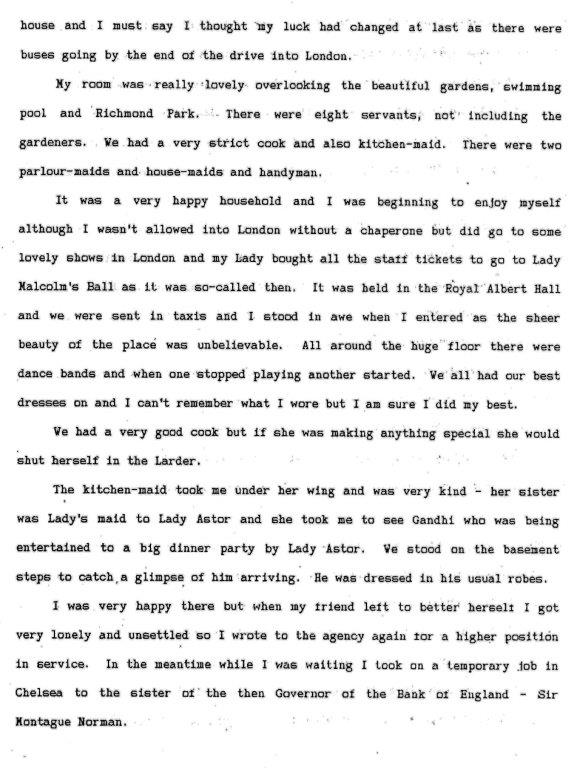An Old Man Rambling
“They are not long, the days of wine and roses” (Ernest Dowson)
They say that age brings wisdom. If it does, then it does to someone else, because I haven’t noticed it. However, since I can still think then I should be able to write. So I hope that I can put together a few random thoughts which might amuse some who have lived when I did or, perhaps, even instruct and entertain the young.
When I look back on earlier times one thing stands out: communication. When my family and I arrived in Edwinstowe our telephone number was 9. In these days of instant communication, I think it would be a great leap for a young person to imagine what it was like. We entertained many people who were waiting to receive a call from their son or daughter and sometimes it was successful. The telephone service became almost impossible when the war began. What did we do? We wrote letters. There was a device known as a telegram. Small boys, wearing little round hats, pedalled furiously to deliver them for the Post Office. Telegrams however, became connected with death and disaster in the 1914-18 war and so were used reluctantly. I remember my mother telling me that, after the terrible and costly battles on the western front, telegram boys were busy all day and mothers watched them afraid that they may knock on their door. Now almost instant communication is possible but I do wonder about its quality. I also wonder how many “How are you? Not bad. How are you?” etc. etc. are coursing through my head as I write and are doing any damage? Not to me but to our wonderful language.
Grocery Boy
A Grocery Boy, Oh happy days!
In the early 1950’ I, along with Ken Bungay and Pete Green was a grocery boy for Woodhead’s shop on the High Street. Woodhead ‘s was a smashing shop with Mr Bond as manager and three lovely girls, Pam Snuggs, Muriel Freeman and Margaret Scrooby. On entering the shop you were met by the aroma of freshly-ground coffee, a warm welcome and a smile. Although most of our deliveries were in Edwinstowe, others took us to Ollerton, Budby, Clipstone, Gosthorpe and Perlethorpe. One of my weekly trips took me out to Perlethorpe and, in the early 50’s, part of the forest was still restricted. My journey through the forest started at the top of the hill opposite to where the Visitor Centre now stands. A narrow path ran close to the Thoresby pit tip but, before I could venture down the path I had to show my special pass to the sentries in a wooden hut. Moving down to the main Ollerton – Budby road and back into the forest arriving at ‘Buckgates’ I was again stopped by guards. Near Thoresby Hall, passed the many Nissen huts with their army supplies, and rows of tanks. I turned right, past the church, and into Perlethorpe with my two deliveries. My other long trip was to Clipstone, to a Mr and Mrs Bill Crouch at Third Avenue. Mr Crouch could often be seen walking from Clipstone to Old Clipstone with his children on their way to the small church. On a sunny evening I decided to go to Clipstone via the fields make my way past the ‘rec’ the cornfield and on to the swing gates. It was at this point that two small boys asked me to help them catch a big fish in a small stream. Leaning my bike on the fence I went to look at the fish, but whilst there, my bike slipped down the fence. After helping the boys I returned to find the bag of eggs on top of the box of groceries had moved, cracking an egg. (This was before egg boxes). Continuing my journey, thinking how to explain the cracked egg! I arrived at Mr Crouch’s house and he invited me in. “Put the box down there he said pointing to the floor, which was close to a child sitting in a low chair. The child was playing with a metal car, which was suddenly thrown into the box of groceries, on top of the eggs. Mr Crouch calmly said, “I think that has broken an egg”. I bet it has”, was my reply. Without another mention Mr Crouch said, there have a drink of sarsaparilla while I play you a couple of hymns on the organ. Back at Woodhead’s we would help the girls when possible, and be rewarded with accidentally-broken Cadbury’s finger biscuits. My weekly wage was either 10/6 or 12/6 if we worked Saturdays: The money was spent watching Sheffield Wednesday. I caught the train at Edwinstowe Station, I arrive at Wadsley Bridge, Sheffield. My entry to the ground and a pie and Bovril at half time still left me with some change. This was an age when shops were shops not supermarkets, and we were safe riding through the forest and over fields…Oh Happy Days.
Brian Wathall
1930s and the staff of the Coop.
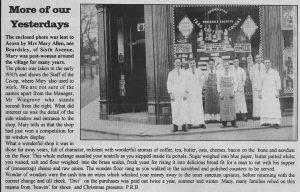
Memoirs of a Paper Boy
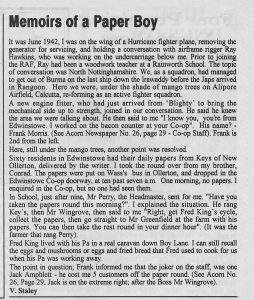
George Slingsby of Rufford – Behind the Green Baize Door.
George Slingsby was in service at Rufford and he recalls:
George, Memoirs of a Gentleman’s Gentleman by Nina Slingsby Smith
While the staff were sitting in the kitchen having lunch the King joined them.
“….George made a grab for his jacket, but the King held up his hand. ‘Please, don’t let me disturb you, I am the intruder’. He walked over to George and cast a covetous eye on the tankard of beer.
….George drew off a foaming pint of the draught beer and handed it to His Majesty, who took a seat on the opposite side of the table, while his little dog jumped up and sat beside George. The dog clearly had ideas about the bread and cheese on George’s plate, and kept lifting one paw expectantly. This rather put George on the spot, until the King saw the situation and laughed.
‘I’m afraid my dog has no manners at all’, he said. ‘He will give you no peace until he gets some of your lunch’.
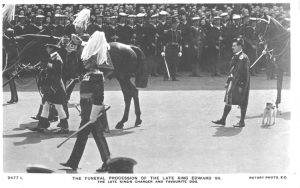 If the dog had belonged to anyone else, George would have fed him tit-bits automatically. Now with the King’s consent, he let Caesar finish what was left on the plate.”
If the dog had belonged to anyone else, George would have fed him tit-bits automatically. Now with the King’s consent, he let Caesar finish what was left on the plate.”
Caesar at the King’s funeral. Read more about Caesar on the John Wright Barker page. https://edwinstowehistory.org.uk/local-history/people/artists/john-wright-barker/
The Lacey Family
Maureen Hopkins, writing from Mapperley, Nottingham, takes us on a stroll down
Memory Lane. She reminds us that her grandfather, Samuel Lacey, was a farmer in the
Edwinstowe locality from about the time of the First World War. He worked at Villa
Real, on Mansfield Road, and at Woodcote Lodge, before moving to Blackhills, the
farm opposite the lane leading to Thoresby Colliery, in about 1939. Samuel’s wife,
Florence, bore seven children: Martha, Florence, Harry, Frances, Ivy, Jeoffrey and Lucy
(who died in infancy).
Maureen’s mother was Ivy, who married and settled in Nottingham, but Ivy would visit
Blackhills nearly every weekend, so Maureen, together with her sister, Eileen, became
very familiar with our village. She relates that her mum was ill for a time so she stayed
at Blackhills and attended the Church School (now the Village Hall). She vividly
remembers being carried to school by her Aunt Frances, when the snow lay so deep that
she was unable to walk. Firmly imprinted on her memory is the warm school room
which was heated by an open fire .When Samuel died his widow moved to a cottage on
Mill Lane and Ivy’s frequent visits were a great comfort to her, especially as she would
be accompanied by her daughters. Maureen now comes to her mother’s grave in the
Forest Cemetery. She remarks, with a touch of nostalgia, that some of the old buildings
in High Street have hardly changed with the passage of time.
Three of Samuel and Florence’s children remained in Edwinstowe and will be known
by some of our older residents. They are Martha, who married Walter Lintin, Harry,
who worked at the colliery, and Frances, who was housekeeper to the Reverend
William Snow, a former curate of our parish.
Walter Lintin, a railwayman, was a revered Clerk to the Parish Council, which
subsequently named Lintin Drive in his honour. Harry was an outstanding goalkeeper
for Thoresby Colliery F.C. in the thirties and forties. Frances, whose married name was
Wood, died as recently as 1998, in the same year as Maureen’s mother and sister,
Eileen. Frances continued to keep house for ‘Billy’ Snow when he was appointed to the
livings of Muskham, Laxton and Caunton. A respected Canon of the Southwell
Diocese, Billy endeared himself to all the Lacey family. Maureen’s Uncle Jeoffrey was
killed in North Africa, while serving with the Eighth Army, and his name appears on
the village war memorial. https://edwinstowehistory.org.uk/local-history/war-years/second-world-war/the-fallen-world-war-ii/
DW
Rev John Millns
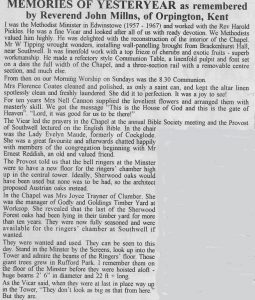
Fred Scully
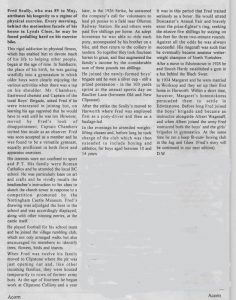
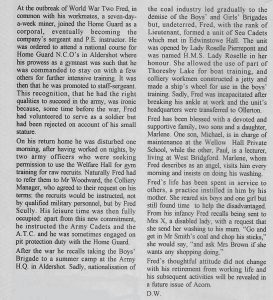
Life in the 1900s – Mary Isabella Maxfield
Mrs Mary Isabella Maxfield, of 79 Sixth Avenue, sent Acorn this fascinating autobiography.
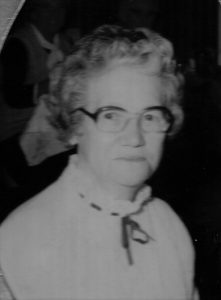 I was born in Gosport in 1910 but spent the early part of my childhood in Southampton where my youngest brother was born in October, 1913; I was the second youngest of seven children.
I was born in Gosport in 1910 but spent the early part of my childhood in Southampton where my youngest brother was born in October, 1913; I was the second youngest of seven children.
War was declared on the 4th of August, 1914 and my father, who had previously served with the Royal Engineers, returned to his regiment. Two teenage brothers also enlisted, the elder in the Royal Navy.
The music of the military bands and men marching to embark on ships was exciting to see and hear. Folk cheered, laughed and cried while watching them go on board. Soon we were gazing skywards at the wonder of aeroplanes, while bows and arrows disappeared and rough models of planes and guns became the toys for children’s play. Before long came the dreaded telegrams and mothers, wives and sweethearts shared their grief.
We children would stand on the bridge above the rails to watch as the wounded were helped from trains, some on stretchers, others blind, or without limbs and with battered heads and faces.
A damaged tank was on display to encourage the gathering of funds and later the portrait of Lord Kitchener appealing for more men.
I was fortunate to see King George V and Queen Mary waving from a slow moving train during the First World War and, later, a Zeppelin.
Food was short and, after hours queuing, my mother would come home and fall unconscious to the floor. Often our breakfast was a slice of bread and beef dripping broken in a bowl with salt, pepper and hot water. My ten-year-old brother rose in the early hours to do odd jobs at the bakery and receive a few coppers. Sometimes he was given a bag of cut-offs, (a crusty finger of bread chopped off the side of a loaf). At weekends he did a paper round and, rushing in one day, he shouted, “Mum, our Tom’s ship’s gone down”. No sound but a strange stillness held us all. It was in May, 1916; that H.M.S. Invincible was sunk at the Battle of Jutland.
Then came the sad sight of maimed ex-servicemen begging in the streets, one legless paddling bare hands on the ground sitting on a wooden platform on wheels, others disfigured and maimed. My 13-year-old sister worked a milk round with a pony & trap with churns of milk and a measuring can for two years, then in the munitions factory.
One night we were woken by a strange sound downstairs, so mum, lighted candle in one hand and a steel blade in the other, crept downstairs, with us four kids tagging behind. Mum soon found the reason, an empty gas meter ticking loudly. Our gas pipe stuck out from the wall with upturned end where mum placed a bit of rock salt for the flame to curl round, the fragile mantel too expensive. Sitting by mum in the evenings she would read to us or sing hymns and, on wild stormy nights, say, “God pity the sailors on a night like this”.
In 1918 dad was given the opportunity to leave France and fill a vacancy for a blacksmith at a midland furnace, so on Good Friday, 1918, in pouring rain, he arrived seeking lodgings. We joined him in January, 1919, but, before leaving, an unpleasant incident left a horrid memory. My brother, now 5 years old and a weak ailing child, unable to walk or crawl, couldn’t go to school. One day two officials came to take him away, but mum struggled and fought to keep them out. Finally they left shouting and threatening her with prison, etc. However, the day arrived when the railwaymen came to pack our furniture and took it to transport it north. Visiting friends before we left – mum had a friend who lost her husband and five of her six sons in the war – she said, “I never thought the day would come when I would thank God a son of mine was born a cripple, a hunchback cleft-footed boy who worked for the butcher”, words that puzzled me then and long after 1919.
After a long and tiring day, with corridors and carriages of the trains packed solid with ex-servicemen, we finally arrived at a midland station (Renishaw, near Chesterfield).
Starting to walk to our house we were overtaken by a lady with a pony and cart who put the smallest three on her cart, leaving us on a dark winding lane. Dad, who had met us, warned us to keep to the middle, as there was a bog on one side and a dyke on the other. Not realising what these were, I kept close to the others. Then, suddenly the whole world lit up. I was terrified but dad said, “It’s all right, just the slag from the smelting ore being tipped out”. We arrived at an empty house with a broken window and a concrete floor. What we had carried were all our worldly goods. There came a knock on the door and someone entered, bringing blankets, then others with rugs, old coats, cushions and an old mattress. Our furniture never arrived, lost on the railway. We learnt to cut strips of cloth and peg rugs while orange and apple boxes became dressing tables and seats. Bedroom floors, stairs and sitting room floors were scrubbed every week and not till I was in my teens did mum manage a canvas stair carpet. Second-hand furniture was gathered bit by bit. Mum, an excellent seamstress, made all our clothes. Our first morning brought the sad news of a 19-year-old neighbour’s death in a roof fall at the pit.
Years of poverty and unemployment led to the 1926 strike with illegal outcrops and tunnels dug for coal or brunch (soft coal). It was then our doctor died and a new one, a Scot, arrived. After a couple of weeks he sent round leaflets asking us to join his Shilling a week club. We would have as many visits, advice and medication free, as required. The thought of no bills had all joining and, true to his word, night or day, he came when required. In 1921, one brother and myself, by joining hands, made a seat and carried the youngest, now 8, up hills through fields to school. The health of folk improved with our very first free health service until the unrest began again in the world.
In 1931 my youngest brother, who suffered ill health throughout his childhood, joined the army and he was due to be discharged just as the Second World War broke out. He served in France and Burma where he was wounded by a bullet through his throat, which removed his teeth and tonsils. He survived into his old age, passing away last year. It was 1931 when, as a married couple, my husband and I came to Edwinstowe, lodging on Fifth Avenue with Tom & Harriet Moore, before moving to Fourth Avenue cul-de-sac, behind the old Post Office, next door to Bill Cook, Charlie Salt, Harry Jones, the Organs, Clewes and Higginbothams. It was here that my two daughters were born. In 1935 I moved to my present address where two sons were born.
The miners suffered the same struggles and strife, Hitler and the Nazis ruled Germany and overtook Poland, torturing and killing the Jews. War was declared in 1939 and the miners, no longer despised, became essential to the war effort, working all hours, and conscripts were sent to the war or as Bevin boys to the pits. We kept pigs and poultry to eke out rations. The Home Guard was formed, Joby Dean with his monologues, Mrs Lena Brown and Otto Woolley’s renditions of the classic In an English Country Garden were star turns that entertained us at the Miners’ Welfare. My husband joined in rescuing men buried in a fall. One badly injured, was saved by the other being bent over him. After a long illness, yet still working, my husband had a heart attack and died in March 1963. Both my sons entered the Royal Navy one in Medical the elder in Submarines.
I remember holidaying in Brighton with a friend in the 1970’s, when the Queen opened the Marina. Strolling round during the morning we were shown inside the marquee where Queen Elizabeth would speak. The inside was lined with colourful silk, draped beautifully. Standing outside our hotel after lunch, and joined by a group of handicapped children, we saw the Queen and Prince Philip drive by in front, the Queen turning to smile at the children.
Gardening, knitting, sewing and crochet were my hobbies but they are no longer possible. When, in 2003, my grandson was serving in the army in Iraq, my life had turned full circle.
Footnote:
Mary died in 2011, aged 101.
Madge Riley Ladies Maid….. ‘Private gentlemen’s Service’
Alice Beniston
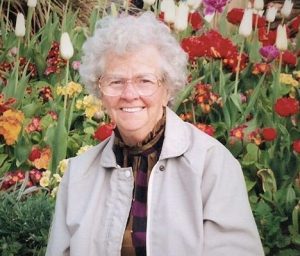
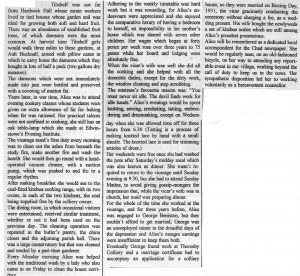
Edwinstowe School 70 (90) Years ago.
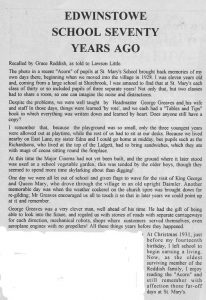
Val Jones (teacher) remembers V.E. day in 1946.
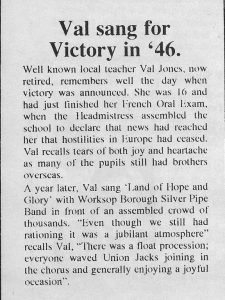
Pam Bird (Councillor) Remembers V.E. Day
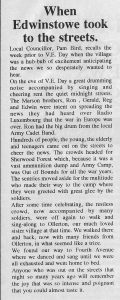
Welfare Hall and King Edwin’s
Reading your article about the Welfare Hall brought back lots of memories about my Junior 1 year in the classroom there, which was probably around 1963. It felt very special to be in this classroom, away from the rest of the school, especially as our teacher was Mrs Bradbury. The desks seemed very old-fashioned (even in those days) and the teacher’s desk was higher than the rest. There were no windows to see out of but, around the edge of the room, were benches, which we used as nature tables. It was here we experimented growing mustard and cress. I felt very upset to fail with that; I had to ‘over-water’ mine – I just knew this was going to be bad news. One day, a friend and I were sent on an errand to the main school, returning a large box of staples. Walking past the tennis courts, somehow the box was dropped and there were staples everywhere. We were terrified at the thought of having to show the badly repacked box to the head, Mr Kingston. Another memory was of a classmate ‘splitting his head open’ on the railings. I was horrified by these words used to describe his injury and quizzed lots of people who had seen it to try to find out what the injury looked like, whether he would ever recover (from his head split in two!), and could not understand why everyone was blasé about it. In the Infants I had caught the school bus home to the other side of the village but now my eldest brother came to meet me on his way home from the main school. One winter’s day I waited and waited for him, and eventually walked to the school to wait for him there. I must have cut a dejected figure, and someone must have passed the news on to my brother as he appeared at the door to tell me he was in big trouble. He had been washing paint brushes after an art lesson and a couple of them had disappeared down the plughole and he had to try and get them out. Mr Kingston again! To add to my misery my socks had ‘gone to sleep’ in the toes of my wellies, so I was feeling very miserable. At some point during the year we must have moved back to the main school because I also remember having Mrs Bradbury as my teacher in one of the classrooms there. Judith Staley
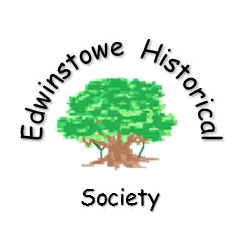 Edwinstowe Historical Society
Edwinstowe Historical Society





